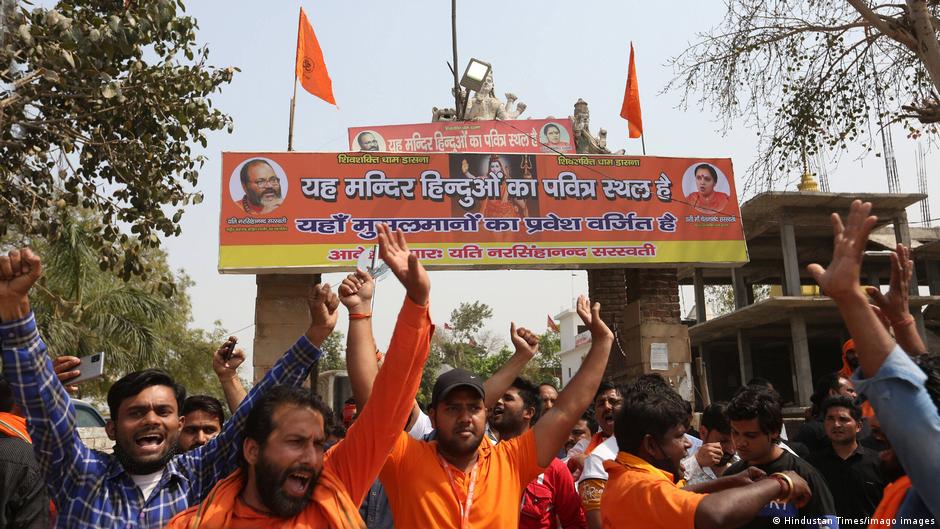India at 75: How Hindu nationalism overshadows secularism
India is being gradually transformed from being a secular, multicultural state to a Hindu supremacist one, say activists and minority groups.
When India gained its independence from Britain in 1947, its founding fathers envisioned the newly free nation as a secular, multicultural state. Over the next 75 years, the South Asian country has transformed from being poverty-stricken into one of the world’s fastest-growing economies. It has also emerged as a democratic counterweight to its authoritarian neighbor, China. India has held free elections since its independence and had peaceful transfers of power, boasts an independent judiciary and a vibrant media landscape. But some believe under Prime Minister Narendra Modi’s government, which has been in office since 2014, there has been some backsliding when it comes to the country’s secular character. The defining credo of Modi’s Bharatiya Janata Party (BJP) since 1989 has been Hindutva, a political ideology that promotes the values of the Hindu religion as being the cornerstone of Indian society and culture.
The Modi regime is making legislative, administrative and cultural changes that seek to transform India from a secular democratic republic to an authoritarian Hindu-supremacist one, Kavita Krishnan of the All India Progressive Women’s Association told DW. That’s why I prefer the term Hindu supremacy to describe Modi’s politics, she added.
Hindu nationalism on the rise
Since its independence, India has been proud of its multiculturalism, even though it has occasionally struggled with bloody sectarian violence. Hindus make up the overwhelming majority of India’s 1.4 billion people and there have been growing calls in recent years from religious right-wing groups to declare India a Hindu nation and enshrine Hindu supremacy in law. The demands, coupled with the BJP’s pursuit of a Hindu nationalist agenda, have alienated religious minorities, particularly Muslims, critics say, pointing out that there has been a marked increase in hate speech and violence targeting the nation’s 210-million-strong Muslim community in recent years. Some minority outfits complain that the BJP’s aggressive Hindutva policies treat them as second-class citizens. A citizenship law passed in 2019 called the Citizenship Amendment Act (CAA) fast-tracks citizenship of Hindu, Sikh, Buddhist, Jain, Parsi and Christian immigrants from Afghanistan, Pakistan and Bangladesh who arrived in India before 2015. However, critics say it excludes fast-tracking citizenship rights for Muslims. In 2020, Muslim-majority neighborhoods in Delhi were the scene of violent riots that were set off by protests against the CAA. More recently, a controversy over women wearing the Islamic headscarf hijab in schools and colleges has sparked tension and protest in southern India between Hindus and Muslims. Some states ruled by the BJP have used bulldozers to demolish the homes and shops of alleged Muslim protesters, a move decried as a form of collective punishment. Hindu groups have also laid claims to a number of Muslim sites they say were built atop temples during Islamic rule.
BJP denies religious discrimination
Saira Shah Halim, writer and activist, said the old liberal order was struggling in the face of a rising ethnic nationalism, undermining the country’s standing as the world’s largest democracy and raising doubts about its future as a secular state. Hindu nationalism should not be accompanied by hating fellow citizens from the minority community. This hatred is being encouraged by authorities and carried out with impunity where oppression of Muslims has become so pervasive, Saira told DW. The BJP, however, has consistently denied that it discriminates against Muslims. Shazia Ilmi, a BJP spokesperson, dismissed the criticism that the party was trying to create a national identity in a manner that excludes or marginalizes religious minorities. India is home to diverse cultures where people of different faiths and sects have been living in harmony. India has the moral and spiritual authority to lead the world on path to peace, Ilmi told DW.
The BJP argues that it was the opposition Congress party which ruled India for over five decades following independence that was responsible for undermining secularism in the country by pandering to extremist elements in various religious communities.
Growing divisions and mistrust
The growing religious divide has stoked mutual suspicions between Hindus and Muslims, contributing to deteriorating personal relationships as well as rising intolerance. Qurban Ali, a Muslim resident of Kanpur city in Uttar Pradesh state, says every year Hindus in his locality gather at his house during the Islamic festival of Eid al-Fitr to celebrate and feast together, part of a tradition they cherished for years. But this time, no Hindu came to greet us. It was strange when every year they have been an important part of the festivities. Life has changed in the country, Ali, an engineer, told DW. Hasan Suroor, author of the recently published book Unmasking Indian Secularism, underlined the urgent need for a new road map to restore communal harmony before it’s too late for a course correction. The idea that Hindus have first claim over India has become deeply ingrained, even among many liberals. Any sustainable solution will require the recognition of the de facto Hinduisation of India over the past decade, Suroor told DW. This is not a plea for abandoning secularism altogether or suddenly embracing a theocratic Hindu state but to look for a model in tune with contemporary political and social realities. Suroor added that a new deal underpinned by realism, rather than idealism, would mean finding the right balance between minority rights and the majority community’s sensitivities.
12 Aug 2022,20:39














 Live Tv
Live Tv
